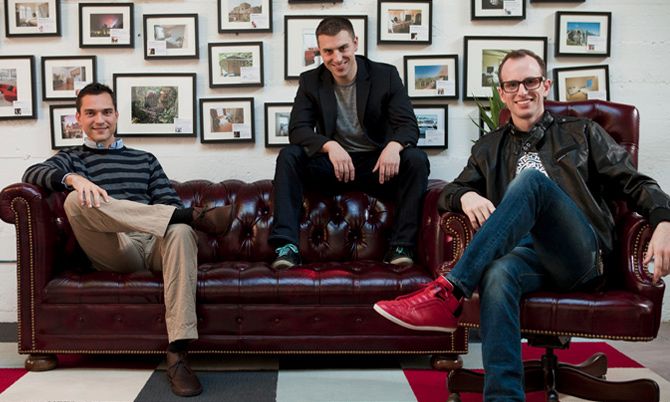![]()
You are welcome to share your thoughts on this article written by Kathy Oneto,Vice President, Brand Strategy at Anthem Worldwide, San Francisco
Their generation is optimistic, aspiring and skeptical. They’re moving at an unimaginable pace—absorbing knowledge, making an infinite amount of connections and sharing information rapidly through their networks. They have grown up in a world where, with the help of the Internet, Christmas shopping could be done in the comforts of their own beds and sending mail takes a matter of seconds. The Millennial generation, those born between 1977 and 1994, are characteristically candid and confident—unafraid to call a spade a spade. As such, they seek in their brands what they see in themselves: real, transparent and genuine voices. They are a force to be reckoned with, changing the modern marketplace and searching for meaning in a fast paced environment. To appeal to this mass, you need to be sure that there is meaning behind what you do—whether it comes through your product, your business model or your culture—so that Millennials can truly rally behind and build an intangible connection with your brand.
Why do they seek this meaning? Because the meaning of the “American Dream” itself has seen drastic change with this generation. Where prosperity and success were previously linked to material wealth, they are now growing more and more concerned with personal fulfillment. Surely the domestic and global events that have occurred in the backdrop of this group’s rise and development have effected this change. From the Dot-com bubble to the housing boom and bust, from the War on Terrorism to the Global Financial Crisis, Millennials have faced the toughest economic climate in recent times. Unemployment rates for those in their early 20’s have risen to nearly 20%. To Millennials, success now comes in the form of reaching personal goals and building real emotional connections—they seek meaning. And according to Glenn Heimstra of Futurist.com, it’s unlikely that this value shift will reverse even once the economy rebounds. With this in mind, it’s not enough that businesses offer material offerings—there must be a real emotional element for Millennials to embrace, as well.
You should care about this cohort because Millennials are a connected force. They have networks of hundreds and the tools to spread information like wildfire. They have influencing power and are unafraid to express their honest opinions. Just look at the social media sites popular amongst Millennials like Twitter, for which the average user has 126 followers. Or even Yelp, whose users are free to rant or rave about local businesses. Businesses who can successfully build solid, meaningful relationships with Millennials have the opportunity to turn their young followers into their brand ambassadors given these connected communication mediums. In fact, a study released by public relations firm, Edelman, found that globally at least 80% of Millennials have “taken action on behalf of a brand they trust—including sharing brand experiences with others, joining online communities, and posting reviews online.”
FAST FACTS: MILLENNIALS
- Children of the Baby Boomer generation, born between 1977 and 1994 (ages 17-34 in 2011)
- Millennials make up 23% of the United States population
- New York, Los Angeles, Chicago, Dallas and Houston have the largest population of Millennials
- A diverse generation: Only three in five Millennials are non-Hispanic whites
And if you don’t connect with them, they’ll just find a way to do it themselves. If there is a need to be met, Millennials—a skilled and confident group of go-getters—are perfectly adept and willing to find a way to meet it themselves. Their generation has bred some of the most successful ventures of recent times, and it doesn’t stop with Mark Zuckerberg of Facebook. Joe Gebbia and Brian Chesky, founders of AirBnB, first offered up their San Francisco loft when they found that visitors to a nearby conference had trouble finding a place to stay, as all the hotels in the area were fully booked. Realizing this was a common problem facing many travelers, they created this community marketplace for travelers to find short-term hosts. It’s a prime example showing that if businesses fail to understand and act on the needs and problems of consumers, they should be sure that Millennials—despite their youth—have the capability to take the bull by the horns and come to the rescue.
Some companies are answering the call of Millennials and providing them the connections they’re looking for. Whole Foods is one where the focus on product has led to a brand that Millennials can trust, supplying fair trade items and sourcing from local producers. They have even become more transparent with their “Whole Foods Market Responsibly Farmed” seal and the wild-caught seafood sustainability rating system, showing the best options and which to avoid in their stores.
Photo: Joe Gebbia, Brian Chesky and Nathan Blecharczyk took the initiative to create AirBnB after finding there was a need for more accommodations in San Francisco when conferences and conventions came to town.
Toms is a great example of a business model that resonates with Millennials. Millennials have been shown to be more socially aware than previous generations, and businesses can benefit from partnering with them on social causes. With the goal of placing a pair of shoes in need for every shoe purchased by its customers, Toms and its One for One business model has been able to connect with Millennials in this way, appealing to those hoping to take their dollar further and be part of a social movement.
Photo: Toms encourages its consumers to take photos of how they wear their Toms and post them on their website. After seeing teens sport their shoes at proms and brides and grooms wear them on their special day, Toms came out with a formal line including shoes made with grosgrain materials and even glitter.
Some businesses are also creating cultures in their companies that will attract Millennials. Take a look at how Method has brought some fun to the lackluster soap and laundry detergent categories and you’ll see that much of that has to do with their culture where being “weird” is embraced and individual personalities can be expressed. Even Andrew Mason, founder of group buying website Groupon, is bringing “meaning” into his culture and business dealings, choosing his business partners based on if they are “genuine and real.”
So while the immense purchasing power of the Baby Boomer generation is well deserving of attention, the growing force of the Millennial generation should not be ignored. They’ve grown up in a very different environment and are placing more value on the intangibles than their predecessors. They’ve proven themselves to have substantial influence in our society and if you don’t connect with them soon, there’s no guarantee they’ll wait around for you to do so. They’ll just go and create a brand of their own.
About the Author
Kathy Oneto is an experienced brand marketer with over fifteen years of marketing and general business management experience. At Anthem, Kathy has led strategic engagements with clients such as Avery, Chevron, Diamond Foods, Peet’s Coffee & Tea, PetSmart, Safeway, and Seagate.


